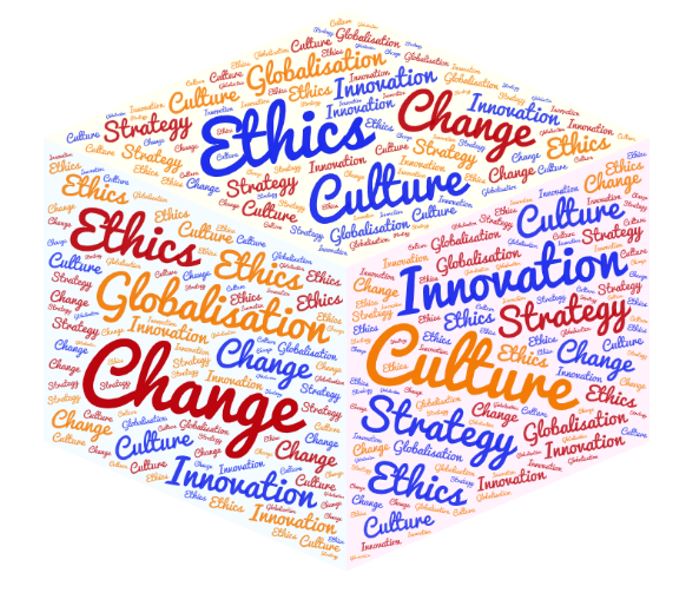CUEGIS
"The world is moving at a tremendous rate. Going no one knows where. We must prepare our children, not for the world of the past. Not for our world. But for their world. The world of the future.” - John Dewey (1859 - 1952)
"A system that values obedience over curiosity is not education, and it definitely is not science." - Sir Ken Robinson (1950 - 2020)
What are concepts?
Concept-based learning (CBL), as defined by the IB's educational consultant Dr. H. Lynn Erickson, is a three-dimensional model that frames facts (content) and skills with concepts specific to the contexts of organizations studied in IB Business Management course.
Concepts are:
- Universal – cut across disciplines/subjects/topics
- Timeless
- Abstract
- Foundational organizers
- Form the basis for inquiry
But there is no universal acceptance of the definition of a concept and we could debate it from different perspectives/disciplines.
ATL Activity
Identify the concepts from the list below:
Amazon rainforests This is not a concept as it is not abstract nor is it universal | Power Yes | Family Yes |
Iraq War This is not a concept as it is not abstract, timeless or universal | Culture Definitely - it is one of the core concepts in Business Management! | Picasso This is not a concept as it is bound in time (1881 - 1973) |
Change Definitely - change is one of the core concepts in Business Management! | Systems Yes | Human rights Yes |
Habitat Yes | Persuasion Yes | Value Yes |
Creativity Yes | Dinosaurs This is definitely not a concept as it is not abstract or timeless, and would be near impossible as a basis for inquiry in Business Management! | Chinese migration Migration on its own would be a concept, but 'Chinese' migration is no longer abstract |
Quick Quiz
Identify the key prescribed concept from the IB Business Management syllabus.
| Description | Key concept |
| Refers to the moral principles and values that form the basis of how a organization conducts its operations and business activities. In the corporate world, every aspect of an organization's operations and its decisions is likely to have moral implications on both its internal and external stakeholders, as well as impact on the natural environment. | Ethics |
| Refers to evolution or transformation of internal and external factors affecting the activities and operations of a business over time. Examples of such factors include a new management structure in th workplace, the threat of new competitors in the industry, improved technologies and processes, and new trends in consumer behaviour. | Change |
| Refers to the intended or actual actions of a business, which are designed to achieve the organization's long-term goals. It is about the long-term decisions and measures that an organization makes in order to satisfy the needs and wants of their various stakeholders. | Strategy |
| Refers to something new and progressive in order to improve productivity and improved customer satisfaction. It can be incremental or radical in terms of improvements to a product, process or proposal (business idea). Ultimately, it helps a business to be more competitive and successful. | Innovation |
| Refers to the accepted behavioural norms, beliefs and values of people within an organization or society, which is developed and evolved over time. Essentially, this shapes how and why things are done within a business organization. | Culture |
| Refers to the increasing flow of goods and services, fiance, employment and ideas around the world. The activities of multinational companies contribute to the growing integration of the world's economies and cultures. | Globalization |
Top top!
As with all concepts, there is no universally accepted definition of change, culture, ethics, globalization, innovation and strategy. Students are not expected to memorise the definitions or examples above - nor should they. What is important is that students are able to communicate their own interpretation and understanding of these six concepts, both in general terms and with regards to the academic discipline of Business Management.
The power of CBL (concept based learning) in IB Business Management
"If we teach today's students as we taught yesterday's, we rob them of tomorrow." John Dewey (1859 - 1952)
The power (benefits) of teaching through concepts include:
- Gets students (learners) to see the bigger picture
- The ability to think from different perspectives (especially as IB students are learning 5 other academic subjects)
- Cognitive framework for transferring / making deep connections in knowledge within and across disciplines
- Future-proofing student learning.
InThinking resources for CUEGIS (concept-based learning in IB Business Management)
Click here for video documentaries to help with preparing for the CUEGIS essays.



